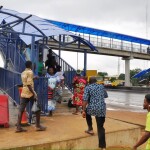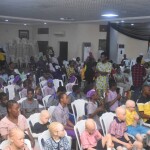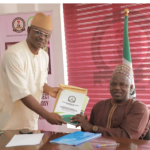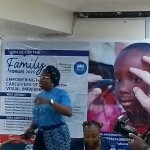By Gideon Oladimeji
At the Alaago Meji Train Terminal, Yaba, Lagos, first timers and regulars pour in and out in fluid, sure-footed patterns. Those travelling to Abeokuta or Ibadan must walk in to the ticketing area, step in the walk-through door to check in, and hop on the escalator that transports them to the departure or arrival halls. The boarding platform proves hard on the soles of their feet—if they have one or two to stand on. To enter with both fee in the cabin door same size as the walk-through security door at the check-in point, the passengers must make their pace wider.
The Standard Gauge former President Muhammadu Buhari commissioned in 2021, two years after he signed the Prohibition Act 2018 into law, welcomes the passengers in warmly. Those who can hear feel the caressing tone as they walk down the strait aisle to their seats. The announcer cooing on the PAS ensures the passengers know every station the train pulls up at—in case they lose their able selves in the movies playing forever on the roof screen.
A passenger must be deaf if they sit pat while others disembark at their stations.
The Act, willing to leave no one behind, provides for all Nigerians access to all aspects of this public infrastructure—and other pieces predating it.
So in section 6, the Act states:
From the date of the commencement of this Act , there shall be a transitory period of five years within which all public buildings and structures, whether immovable, movable or automobile, which were inaccessible to persons with disabilities shall be modified to be accessible to and usable by persons with disabilities, including those on wheelchairs.
But the Nigeria Railway Corporation defied the law. Its designs of the stations and the train exclude Nigerians in wheelchairs: they cannot squeeze their assistive device through those walk-throughs, escalators, and cabin doors. The boarding procedures do not accommodate those with hearing impairments: there is no close captions on the screen, or sign language to help them make sense of their environment.
The transitory period expires in February. But the accessibility features the Act mandates government to retrofit to public infrastructure predating the law, and the new one, like the Standard Gauge train, are not in place yet. That failure amounts to violence against the Prohibition Act, and discrimination against persons with disabilities.
Out of concern, Hon. Ibrahim Mohammed moved a motion on February 14. The legislator representing (Birnin Kebbi, Kalgo, Bunza Federal Constituency) prayed the House to compel the NCPWD, the Humanitarian Affairs and the Health Ministries to implement the provision of the Act, particularly the provision of assistive devices.
Mohammed’s prayers came days after the director-general of the Nigeria Institute of Legislative Studies protested non-implementation of the Act. Prof Abubakar Suleiman observed this government dereliction encourages increasing discrimination against PWDs. Suleiman, among other issues, noted that access and mobility problems give rise to identity crisis, unemployment, inappropriate job placement, and lower expectation for PWDs.
He also called on the National Assembly and policymakers to address the realities of this minority.
Not many disability policy observers expected this praying and mollycoddling after five years. Hon. Mohammed didn’t respond to ER questions on the propriety of his prayers at this point. The House Committee on Disabilities Chairman Bashir Dawodu didn’t respond either.
Ikem Uchegbulam, president, the Association of Lawyers with Disabilities in Nigeria (ALDIN), told ER last May the law wasn’t enforceable then. But he hinted there would be massive litigation across Nigeria over this issue of accessibility to public infrastructure when the window closes this February.
Apart from individuals and groups flying to law to enforce their rights, the disability commission also wields the powers, according to Section 38 (n) and (o), to take action in response to the complaints and protests of PWDs.
But Lukman Salami, a lawyer and chairman, the Nigeria Association of the Blind (NAB), doesn’t buy the idea of litigation over the breach.
“The law provides a five-year moratorium, and gives a particular agency or ministry responsibility to ensure compliance. So let’s ask the National Commission for Persons with Disabilities (NCPWD) for the master plan for compliance,” he told ER on February 15. It is its responsibility to provide accessible building codes and designs for public buildings, old or new, to comply with. The commission has not been able to provide these.
As far as owners of public buildings are concerned, Salami noted, there is no breach of any law: they have complied with the existing building code, and no agency has showed them any other template.
“Court is not Father Christmas. Court won’t say because you are PWDs, we have to think it through.”
He explained how accessibility in Lagos has become synonymous with ramps only. Even when one has to cross three lanes, with dividers, for instance in the Berger area, before one can access such a ramp leading up a bridge.
“I am still hammering this fact: The NCPWD has not done a good job of accessibility. We need inclusive building code that we can take to court to enforce. The court will then decide,” he said.
The House has adopted Mohammed’s motion. But it’s hard to ascertain how much meaning such points of order have for the NCPWD and the other ministries. They all have demonstrated a culture that ignores the weightier piece of legislation.







